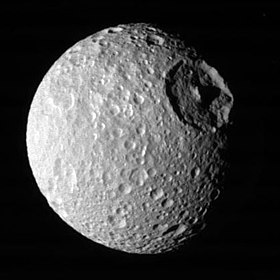Mimas (moon)

Mimas (from the Greek Μίμᾱς) is one of Saturn's largest moons. It is also called Saturn I. Mimas is best known for its large crater, Herschel. In the centre of the crater is a very high mountain. Mimas was discovered by the English astronomer William Herschel on September 17, 1789.[1] It resembles the Death Star from Star Wars. The moon is believed to have created the Cassini Division.[2] This is a 4,800 km gap between Saturn's A and B rings.[2]
Discovery and naming[change | change source]
Mimas was discovered in 1789 by William Herschel. He discovered it on September 17. Herschel discovered it along with another Saturnian moon, Enceladus Mimas was named after one of the Titans in mythology. Mimas was the giant.
Surface[change | change source]
Mimas is full with craters like our Moon. But unlike the craters on the Moon, Mimas has icy craters like going through an icy object. Mimas has craters, but the most famous is the Herschel crater. It is 130 km (80 mi) in diameter. The diameter of Herschel is about 1/3 of Mimas. If a comet or asteroid that hit Mimas were to hit Earth, the crater would be seen from space with all the Earth shown in view. Mimas would evaporate away if it was too close to the Sun.
Exploration[change | change source]
Mimas has been visited by 4 or 5 spacecrafts.

References[change | change source]
- ↑ "NASA: Solar System Exploration: Planets: Saturn: Moons: Mimas". Archived from the original on 2007-08-01. Retrieved 2011-02-05.
- ↑ 2.0 2.1 How it Works Book of Space. Imagine Publishing. 2010. p. 114. ISBN 9781906078829.
